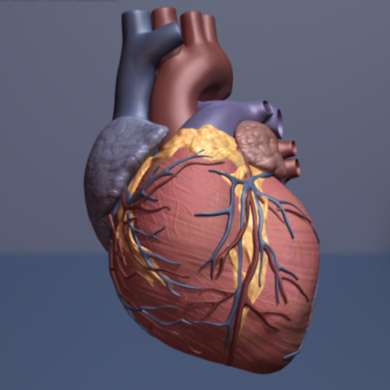This article has been reviewed according to Science X's editorial process and policies. Editors have highlighted the following attributes while ensuring the content's credibility:
fact-checked
trusted source
proofread
Extended P2Y12 inhibitor monotherapy found to benefit high-risk acute coronary syndrome patients

Extended P2Y12 inhibitor monotherapy beyond 12 months after percutaneous coronary intervention (PCI) reduces bleeding and ischemic events in acute coronary syndrome (ACS) patients at high risk for both types of events. That's the finding of late breaking research presented in a Hot Line session today, August 28, at ESC Congress 2023.
ESC guidelines recommend extended dual antiplatelet therapy (DAPT) beyond 12 months after PCI for ACS patients at high risk of ischemic events, while a shorter duration of DAPT is recommended in patients at high bleeding risk. However, the optimal antiplatelet treatment regimen in ACS patients undergoing PCI who are at high risk for both ischemic and bleeding events, a common scenario in real-world practice, is an unresolved clinical question.
P2Y12 inhibitor monotherapy after a short duration of DAPT has emerged in recent years as a novel strategy to mitigate the risk of bleeding. However, an extended course of P2Y12 inhibitor monotherapy with clopidogrel after completion of a standard DAPT regimen in ACS patients who are at high risk for both recurrent ischemia and bleeding has not been studied.
The OPT-BIRISK trial examined whether in ACS patients with both high bleeding and ischemic risk characteristics who remained event-free after a standard course of DAPT following PCI, an extended course of clopidogrel monotherapy would be superior to ongoing DAPT treatment with aspirin and clopidogrel. The study enrolled patients who completed nine to 12 months of DAPT (aspirin plus either clopidogrel or ticagrelor) after drug-eluting stent implantation for the treatment of ACS, were free from major adverse clinical events during the prior six months and were at both high bleeding and ischemic risk.
Patients were randomly assigned in a 1:1 ratio to clopidogrel (75 mg/day) plus placebo or clopidogrel (75 mg/day) plus aspirin (100 mg/day) for nine months. In both groups, this was followed by open-label aspirin monotherapy (100 mg/day) for an additional three months to exclude rebound events. Other medications were given at physician discretion according to guidelines. Follow-up was performed at 3, 6, 9, and 12 months after randomization.
The primary endpoint was the rate of clinically-relevant bleeding nine months after randomization, defined as Bleeding Academic Research Consortium (BARC) types 2, 3, or 5 bleeding. The key secondary endpoint was the rate of major adverse cardiac and cerebral events (MACCE) nine months after randomization, defined as a composite of all-cause death, myocardial infarction, stroke or clinically-driven revascularization.
Other secondary endpoints included the 9-month post-randomization rates of the individual components of MACCE, and stent thrombosis. All endpoint events were adjudicated by an independent clinical events committee blinded to randomization assignment.
A total of 7,758 patients with ACS were randomized at 101 Chinese centers between 12 February 2018 and 4 December 2020; 3,873 were randomly assigned to receive clopidogrel plus placebo and 3,885 to receive clopidogrel plus aspirin. The mean age of participants was 65 years and 41% were women.
The primary endpoint of BARC types 2, 3, or 5 bleeding at nine months after randomization occurred in 95 patients (2.5%) assigned to clopidogrel plus placebo and in 127 patients (3.3%) assigned to clopidogrel plus aspirin (hazard ratio [HR] 0.75, 95% confidence interval [CI] 0.57-0.97; difference -0.8%, 95% CI -1.6% to -0.1%; p=0.03).
The key secondary endpoint of MACCE occurred in 101 patients (2.6%) in the clopidogrel plus placebo group and in 136 patients (3.5%) in the clopidogrel plus aspirin group (HR 0.74, 95% CI 0.57-0.96; difference -0.9%, 95% CI -1.7% to -0.1%; p<0.001 for non-inferiority, p=0.02 for superiority). The incidences of all-cause death (0.3% vs. 0.5%), myocardial infarction (0.4% vs. 0.7%), stroke (0.7% vs. 0.8%), clinically-driven revascularization (1.4% vs. 1.8%), and stent thrombosis (0.05% vs. 0.03%) were not significantly different between patients treated with clopidogrel plus placebo and clopidogrel plus aspirin, respectively.
Principal investigator Professor Ya-Ling Han of the General Hospital of Northern Theater Command, Shenyang, China said, "Among ACS patients at high risk for both recurrent ischemic and bleeding events after PCI who had completed a nine to 12 month standard course of DAPT and were free from major events, a strategy of extended P2Y12 inhibitor monotherapy with clopidogrel for an additional nine months was superior to DAPT with aspirin and clopidogrel for reducing clinically-relevant bleeding and ischemic events during this period.
"The increased rate of MACCE in the clopidogrel plus aspirin group was surprising and may be because hemorrhagic events, which are more common with ongoing DAPT, could be associated with an adrenergic state with increased platelet aggregation due to hypotension, remedial procedures to treat bleeding, and the cessation of anti-ischemic medications."


















